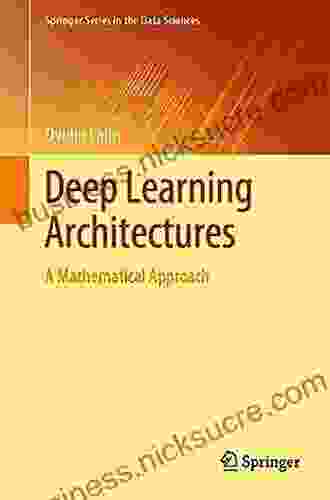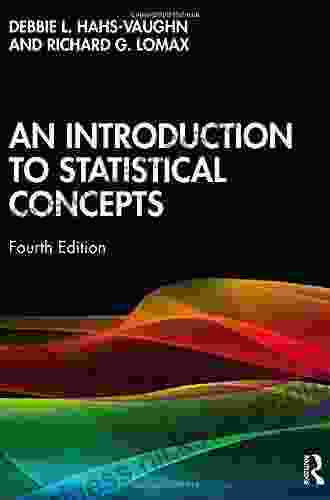Mathematical Approach Springer In The Data Sciences: Unlocking Revolutionary Insights through Advanced Analytics

4.1 out of 5
| Language | : | English |
| File size | : | 20317 KB |
| Print length | : | 790 pages |
In the rapidly evolving landscape of data sciences, mathematical approaches have emerged as indispensable tools for extracting meaningful insights from vast and complex datasets. Springer, a leading academic publisher, has played a pivotal role in advancing this field through its comprehensive collection of research, methods, and applications in data sciences.
This article delves into the transformative power of mathematical approaches in data sciences, exploring Springer's extensive body of work and highlighting key concepts, methodologies, and real-world applications. By harnessing the power of advanced analytics, organizations and researchers can unlock revolutionary insights, drive innovation, and make data-driven decisions that shape the future.
Mathematical Foundations of Data Sciences
At its core, data sciences leverages mathematical principles to analyze and interpret data. Springer's publications provide a solid foundation in these principles, covering topics such as:
- Probability and Statistics: Understanding data distributions, sampling techniques, and hypothesis testing.
- Linear Algebra: Representing and manipulating data in matrix form, enabling efficient computations and dimensionality reduction.
- Calculus: Analyzing data trends, rates of change, and optimization problems.
- Numerical Methods: Solving complex mathematical problems using iterative and approximate techniques.
Methodologies for Data Analysis and Modeling
Springer's publications offer a wide range of methodologies for data analysis and modeling, empowering researchers and practitioners to tackle real-world problems:
- Machine Learning: Developing algorithms that learn from data, enabling predictions, classifications, and pattern recognition.
- Artificial Intelligence: Creating intelligent systems capable of reasoning, problem-solving, and decision-making.
- Statistical Modeling: Building mathematical models to represent data distributions and predict future events.
- Predictive Analytics: Using data and statistical techniques to forecast future outcomes and identify trends.
- Optimization Techniques: Finding the best solutions to complex problems involving multiple variables and constraints.
Applications in Diverse Industries and Fields
The mathematical approaches outlined in Springer's publications find applications across a vast spectrum of industries and fields:
- Healthcare: Predicting disease risks, optimizing treatment plans, and improving patient outcomes.
- Finance: Risk assessment, fraud detection, and portfolio optimization.
- Manufacturing: Quality control, predictive maintenance, and supply chain management.
- Transportation: Traffic optimization, route planning, and smart city design.
- Climate Science: Modeling climate patterns, forecasting extreme weather events, and assessing climate change impacts.
Case Studies and Real-World Examples
Springer's publications not only provide theoretical frameworks but also showcase practical applications through engaging case studies and real-world examples. These examples demonstrate how mathematical approaches have been successfully employed to:
- Identify fraud in financial transactions
- Predict customer churn in e-commerce
- Optimize energy consumption in smart buildings
- Forecast weather patterns and natural disasters
- Develop personalized medicine and treatment plans
Springer's mathematical approach to data sciences provides a powerful toolkit for unlocking revolutionary insights from data. By combining rigorous mathematical principles with advanced analytics methodologies, organizations and researchers can make informed decisions, drive innovation, and solve complex problems across a wide range of industries and fields.
Embracing the mathematical approach is essential for thriving in the data-driven era. Springer's extensive collection of research, methods, and applications empowers data scientists, researchers, and practitioners alike to harness the transformative power of advanced analytics and shape the future of data-driven decision-making.
4.1 out of 5
| Language | : | English |
| File size | : | 20317 KB |
| Print length | : | 790 pages |
Do you want to contribute by writing guest posts on this blog?
Please contact us and send us a resume of previous articles that you have written.
 Fiction
Fiction Non Fiction
Non Fiction Romance
Romance Mystery
Mystery Thriller
Thriller SciFi
SciFi Fantasy
Fantasy Horror
Horror Biography
Biography Selfhelp
Selfhelp Business
Business History
History Classics
Classics Poetry
Poetry Childrens
Childrens Young Adult
Young Adult Educational
Educational Cooking
Cooking Travel
Travel Lifestyle
Lifestyle Spirituality
Spirituality Health
Health Fitness
Fitness Technology
Technology Science
Science Arts
Arts Crafts
Crafts DIY
DIY Gardening
Gardening Petcare
Petcare Harville Hendrix
Harville Hendrix Roger Wiens
Roger Wiens David Nicholls
David Nicholls Brad Walker
Brad Walker Walter Martin
Walter Martin Gabriel J Connor
Gabriel J Connor Dr Terry Zachary
Dr Terry Zachary R M Romero
R M Romero Warren F Kimball
Warren F Kimball Gregory Hodges
Gregory Hodges Rick Curtis
Rick Curtis Jessica Mccrory Calarco
Jessica Mccrory Calarco Robert E Moyer
Robert E Moyer Braeden Baade
Braeden Baade Richard G Lomax
Richard G Lomax Michel Boivin
Michel Boivin Patrick M Andendall
Patrick M Andendall Jean Gebser
Jean Gebser Sean Gordon Murphy
Sean Gordon Murphy Ashley Christensen
Ashley Christensen Michael Mccarthy
Michael Mccarthy Thomas Kinkade
Thomas Kinkade Elliot Davis
Elliot Davis Rosalyn Hoffman
Rosalyn Hoffman Jamie Ward
Jamie Ward Kay Lynn Wilson
Kay Lynn Wilson Arthur Bovino
Arthur Bovino Gerald Pruett
Gerald Pruett Lauren Sullivan
Lauren Sullivan Yvon Chouinard
Yvon Chouinard Gareth Southgate
Gareth Southgate Erving Goffman
Erving Goffman Pat Falvey
Pat Falvey Brendan Noble
Brendan Noble Arturo Escobar
Arturo Escobar N Katherine Hayles
N Katherine Hayles Charlie Craven
Charlie Craven James R Andrews
James R Andrews Barack Obama
Barack Obama Laurie Katz
Laurie Katz David Dibenedetto
David Dibenedetto Drew Neil
Drew Neil Karin Cadwell
Karin Cadwell Beth Shaw
Beth Shaw Aryeh Kaplan
Aryeh Kaplan Stefan Burban
Stefan Burban Lucy Coleman
Lucy Coleman Milo Kemp
Milo Kemp Ash Fortis
Ash Fortis Hazrat Inayat Khan
Hazrat Inayat Khan Kerry Keene
Kerry Keene Pass Your Class
Pass Your Class Kathy Charner
Kathy Charner James Lawson
James Lawson Dawn Hogue
Dawn Hogue James Poskett
James Poskett Bryce M Towsley
Bryce M Towsley Mark Rosenman
Mark Rosenman Barry H Lopez
Barry H Lopez Julia Ann Clayton
Julia Ann Clayton Christine Stephenson
Christine Stephenson Mark Jackson
Mark Jackson Paul Levy
Paul Levy Lynn Arave
Lynn Arave Inc Barcharts
Inc Barcharts Ray Mears
Ray Mears Hunter Allen
Hunter Allen William Henry
William Henry Darren Byler
Darren Byler Chris Hart
Chris Hart Isle Osaki
Isle Osaki Ransom Riggs
Ransom Riggs Ray Jarrett
Ray Jarrett Brett Topel
Brett Topel Rob Rachowiecki
Rob Rachowiecki Richard Hartley
Richard Hartley Emily M Leonard
Emily M Leonard Stephanie Jeanette Bradley
Stephanie Jeanette Bradley Susan David
Susan David Richard Miller Adi
Richard Miller Adi Kirstie Mclellan Day
Kirstie Mclellan Day R Michael Shaft
R Michael Shaft The Secret Cyclist
The Secret Cyclist Christine Conners
Christine Conners David Hatcher Childress
David Hatcher Childress Regina Leeds
Regina Leeds Art Smith
Art Smith Sarah Leah Chase
Sarah Leah Chase Mercedes Lackey
Mercedes Lackey Jeffery Pfeffer
Jeffery Pfeffer Jessica Grogan
Jessica Grogan Izzy Judd
Izzy Judd Kindle Edition
Kindle Edition Sarah Burton
Sarah Burton Hanna Seymour
Hanna Seymour Dave King
Dave King Cassandra Vieten
Cassandra Vieten 11th Edition Kindle Edition
11th Edition Kindle Edition Sparknotes
Sparknotes Bradley G Stevens
Bradley G Stevens Stefan Ecks
Stefan Ecks Itzhak Bentov
Itzhak Bentov Stacy Lynn Harp
Stacy Lynn Harp Richard Jefferies
Richard Jefferies Joyce Goldstein
Joyce Goldstein Arthur Scott Bailey
Arthur Scott Bailey Kindle Interactive Edition
Kindle Interactive Edition L M Montgomery
L M Montgomery Mizuho Kusanagi
Mizuho Kusanagi Kurt Koontz
Kurt Koontz Elaine Menger
Elaine Menger Tom Holland
Tom Holland Nir Barzilai
Nir Barzilai John H Cunningham
John H Cunningham Joel Spring
Joel Spring Jeremy Wade
Jeremy Wade Swami Vivekananda
Swami Vivekananda Jennifer Love
Jennifer Love Bradford Angier
Bradford Angier Rachael Lippincott
Rachael Lippincott Logan Duvall
Logan Duvall Gerry Donohue
Gerry Donohue Brian Noyes
Brian Noyes Spanked Teen
Spanked Teen Sofia Price
Sofia Price Nichola Luther
Nichola Luther Pat Mullaly
Pat Mullaly Zita Grant
Zita Grant Simon Singh
Simon Singh Gong Chen
Gong Chen Linda Carter
Linda Carter Tiffany D Jackson
Tiffany D Jackson Irene Mchenry
Irene Mchenry Drew Monkman
Drew Monkman Jeremy L Holloway
Jeremy L Holloway Robert H Pantell
Robert H Pantell Mark A Runco
Mark A Runco Rachel Blunk
Rachel Blunk Jenny Hall
Jenny Hall Jacqueline Melvin
Jacqueline Melvin Michael Strevens
Michael Strevens Braun Anthony
Braun Anthony Jessica Seinfeld
Jessica Seinfeld Mark Powell
Mark Powell Eileen Pollack
Eileen Pollack Benny Lewis
Benny Lewis Ricardo D Palacios
Ricardo D Palacios Courtney Loquasto
Courtney Loquasto John Lawson
John Lawson John Miller
John Miller Penny Simkin
Penny Simkin Scott A Small
Scott A Small Drew Harris
Drew Harris Susan J Fisher
Susan J Fisher Jason Hanson
Jason Hanson Hans Paetz Gen Schieck
Hans Paetz Gen Schieck D A Saia
D A Saia Pat Dooley
Pat Dooley John Treacher
John Treacher Cornelia Pelzer Elwood
Cornelia Pelzer Elwood Douglas Adams
Douglas Adams David Kinch
David Kinch Kathleen Cushman
Kathleen Cushman John L Crassidis
John L Crassidis Cameran Eubanks Wimberly
Cameran Eubanks Wimberly Jessica Rhodes
Jessica Rhodes Ed Parker
Ed Parker Elizabeth E Wein
Elizabeth E Wein Jim Gray
Jim Gray Duncan Wells
Duncan Wells Joseph A Gallian
Joseph A Gallian Match
Match Kathy A Zahler
Kathy A Zahler Bret Pettichord
Bret Pettichord Brad Edmondson
Brad Edmondson Paul Mcghee
Paul Mcghee Kenneth Hayes
Kenneth Hayes Camieyes Inc
Camieyes Inc Rae Yang
Rae Yang Lisa Taddeo
Lisa Taddeo Huntley Fitzpatrick
Huntley Fitzpatrick Tina Olton
Tina Olton Alexander Boxer
Alexander Boxer Edith Pattou
Edith Pattou Paola Roig
Paola Roig Els Van Geyte
Els Van Geyte Brittney Wilson
Brittney Wilson Josh Sundquist
Josh Sundquist Tony Kemerly
Tony Kemerly 005 Edition Kindle Edition
005 Edition Kindle Edition Vijay Vad
Vijay Vad Thomas C Tabor
Thomas C Tabor Kami Garcia
Kami Garcia Douglas Fisher
Douglas Fisher Scott Morrison
Scott Morrison Carolyn Nones Vazquez
Carolyn Nones Vazquez Gabor Szauer
Gabor Szauer P T Shank
P T Shank Joanne Rodrigues
Joanne Rodrigues Arthur Bochner
Arthur Bochner Be Learning
Be Learning Catherine Tucker
Catherine Tucker Stephen Jay Gould
Stephen Jay Gould Kate Gruenwald Pfeifer
Kate Gruenwald Pfeifer Michael Tlanusta Garrett
Michael Tlanusta Garrett Crystal Marie Fleming
Crystal Marie Fleming Simone Elkeles
Simone Elkeles Eric Smith
Eric Smith Lsatmax Lsat Prep
Lsatmax Lsat Prep Marie Bigelow
Marie Bigelow Rojan Robotham
Rojan Robotham J P Moreland
J P Moreland Fred Zeglin
Fred Zeglin Leigh Montville
Leigh Montville Brian Cole
Brian Cole Tori Bortman
Tori Bortman Nystce Exam Secrets Test Prep Team
Nystce Exam Secrets Test Prep Team Hussein A Abbass
Hussein A Abbass Louise Davidson
Louise Davidson Martin Hall
Martin Hall Katie Banks
Katie Banks Holly Jackson
Holly Jackson Wayne Teasdale
Wayne Teasdale Judy Bartkowiak
Judy Bartkowiak Becky Goddard Hill
Becky Goddard Hill Larry Krieger
Larry Krieger Dr Monique Thompson Dha Lpc
Dr Monique Thompson Dha Lpc Robert R Harr
Robert R Harr Howard Burton
Howard Burton Hernan Chousa
Hernan Chousa Mary E Pearson
Mary E Pearson Karl F Kuhn
Karl F Kuhn Norman Link
Norman Link Chris Bird
Chris Bird Gary Paulsen
Gary Paulsen Stefan Klein
Stefan Klein Dustin Lynx
Dustin Lynx Michael J Steele
Michael J Steele Stuart Ritchie
Stuart Ritchie K E Ganshert
K E Ganshert Pamparam Kids Books
Pamparam Kids Books Whitney Holcombe
Whitney Holcombe Jon Patrick Hatcher
Jon Patrick Hatcher Lindsey Bliss
Lindsey Bliss Lore Cottone
Lore Cottone Tracy Zager
Tracy Zager Keith Bateman
Keith Bateman Karen Gravelle
Karen Gravelle Marcia K Anderson
Marcia K Anderson Isaac Asimov
Isaac Asimov Laura Hulleman
Laura Hulleman Joanne Webb
Joanne Webb Paul Henley
Paul Henley E J R David
E J R David Red Dawson
Red Dawson Clifford A Pickover
Clifford A Pickover Susan A Milstein
Susan A Milstein Nancy Johnson
Nancy Johnson Michael Grant
Michael Grant Rika Lukac
Rika Lukac Ascencia
Ascencia Louis Berney
Louis Berney Scott Cookman
Scott Cookman Noelle Stevenson
Noelle Stevenson Jennifer Grouling Cover
Jennifer Grouling Cover Arun Jagannathan
Arun Jagannathan Briana Wiles
Briana Wiles W Michael Kelley
W Michael Kelley Jim Parks
Jim Parks Kathie Lee Gifford
Kathie Lee Gifford Prem Carnot
Prem Carnot Dan Benardot
Dan Benardot Lisa A Alzo
Lisa A Alzo Eric J Wittenberg
Eric J Wittenberg Lisa Crayford
Lisa Crayford Roberta Steinberg
Roberta Steinberg William L Briggs
William L Briggs Jamie Andrews
Jamie Andrews Talk In Italian
Talk In Italian Denny Krahe
Denny Krahe Michael R Ange
Michael R Ange Arthur Staple
Arthur Staple Erik Weihenmayer
Erik Weihenmayer Michelle Medlock Adams
Michelle Medlock Adams Sarah Allen
Sarah Allen Michael Crichton
Michael Crichton Payal Khurana
Payal Khurana Karen M Mcmanus
Karen M Mcmanus Bob Litwin
Bob Litwin T C Edge
T C Edge Jeff Galloway
Jeff Galloway Susan Radulovacki
Susan Radulovacki Charlotte Browne
Charlotte Browne Thomas Berry
Thomas Berry Chris Algieri
Chris Algieri Al Sweigart
Al Sweigart Bill Chambers
Bill Chambers Lynelle Schneeberg
Lynelle Schneeberg Dawn Davenport
Dawn Davenport Jean Haner
Jean Haner Db King
Db King Toby Neighbors
Toby Neighbors S Frederick Starr
S Frederick Starr Sophia Glock
Sophia Glock Scott Draper
Scott Draper Isaiah Helekunihi Walker
Isaiah Helekunihi Walker Meg Meeker
Meg Meeker Deborah Jiang Stein
Deborah Jiang Stein Elizabeth King
Elizabeth King Donald E Brown
Donald E Brown Marlin Bree
Marlin Bree Seth Stein
Seth Stein Brandi Dion
Brandi Dion Doreen Lenz Holte
Doreen Lenz Holte Rod Heikell
Rod Heikell Ruth Ehrhardt
Ruth Ehrhardt Karyn Siegel Maier
Karyn Siegel Maier Jamie James
Jamie James Mistletoe Christmas Collection
Mistletoe Christmas Collection Asanaro
Asanaro Zapheria Bell
Zapheria Bell Sharon L Lohr
Sharon L Lohr Lechna Baram
Lechna Baram Stuart Clark
Stuart Clark Christia Spears Brown
Christia Spears Brown Marc Macyoung
Marc Macyoung Conrad Bauer
Conrad Bauer Charles E Schaefer
Charles E Schaefer Isolina Ricci
Isolina Ricci Leona Hendrix
Leona Hendrix Martin E P Seligman
Martin E P Seligman Ryan Stramrood
Ryan Stramrood Gillian Hutchinson
Gillian Hutchinson Chris Bonington
Chris Bonington Randy Kadish
Randy Kadish Mike Mattesi
Mike Mattesi Darren Palmer
Darren Palmer Katie Shaw
Katie Shaw Auriane Desombre
Auriane Desombre Edwin Monk
Edwin Monk Gail Reichlin
Gail Reichlin Benjamin Alire Saenz
Benjamin Alire Saenz Roz Maclean
Roz Maclean Harvard Business Review
Harvard Business Review Kirkham Ross
Kirkham Ross Kate Gladdin
Kate Gladdin Greg Nelson
Greg Nelson Isaac Newton
Isaac Newton Chris Scott
Chris Scott Rainbow Rowell
Rainbow Rowell John Small
John Small Steve Sheward
Steve Sheward Kate Mosse
Kate Mosse Skyhorse Publishing
Skyhorse Publishing Lisa Damour Ph D
Lisa Damour Ph D Eighth Edition Kindle Edition
Eighth Edition Kindle Edition Seth Fletcher
Seth Fletcher Colin Allen
Colin Allen Tom Gilmore
Tom Gilmore David Bodanis
David Bodanis Elizabeth Parker
Elizabeth Parker Stephanie Muntone
Stephanie Muntone Robert K Yin
Robert K Yin Stan Skrabut
Stan Skrabut Lex Luger
Lex Luger Daniel Mccain
Daniel Mccain Hrishikesh Joshi
Hrishikesh Joshi Forrest Griffin
Forrest Griffin Thomas Henry Huxley
Thomas Henry Huxley Ashley Rhodes Courter
Ashley Rhodes Courter Leigh East
Leigh East Ronald D Siegel
Ronald D Siegel Maggie Tokuda Hall
Maggie Tokuda Hall Dave Seminara
Dave Seminara Justina Ireland
Justina Ireland Lisa Cordeiro
Lisa Cordeiro Robin Theiss
Robin Theiss Steven Kotler
Steven Kotler Mark Zegarelli
Mark Zegarelli Thomas Teselli
Thomas Teselli Kathy Kochan
Kathy Kochan Graham Bowley
Graham Bowley Lynn Clark
Lynn Clark Elaine Howard Ecklund
Elaine Howard Ecklund Frank Morin
Frank Morin John T Moore
John T Moore Claire Hartfield
Claire Hartfield Hsiang Shui Chen
Hsiang Shui Chen Thomas J Sims
Thomas J Sims Nadine Slavinski
Nadine Slavinski Simon Nasht
Simon Nasht Martin Shaw
Martin Shaw Ben Hogan
Ben Hogan Jemma Foster
Jemma Foster Mary Ann Ochota
Mary Ann Ochota Matt Kalman
Matt Kalman Richard F Larkin
Richard F Larkin Peter Goos
Peter Goos Jim Hartnett Pga
Jim Hartnett Pga Paul M Sutter
Paul M Sutter Nancy Springer
Nancy Springer Mariolina Ceriotti Migliarese
Mariolina Ceriotti Migliarese Michael Angelo Costa
Michael Angelo Costa Jesper Juul
Jesper Juul Lance Gettler
Lance Gettler Gavin Chappell
Gavin Chappell Margarita Engle
Margarita Engle Bridget Bishop
Bridget Bishop Mike Rohde
Mike Rohde Dan Jenkins
Dan Jenkins Sharleen Woods
Sharleen Woods Pete Peterson
Pete Peterson Charles Bowden
Charles Bowden Paul Chapman
Paul Chapman Mike Carter
Mike Carter Mike Acker
Mike Acker Jake Maloney
Jake Maloney Philip Pullman
Philip Pullman Belinda Norton
Belinda Norton Cal Peternell
Cal Peternell Peter Haining
Peter Haining Ethan Sawyer
Ethan Sawyer Derek Prince
Derek Prince Rachel Cathan
Rachel Cathan John Vince
John Vince Arthur Beiser
Arthur Beiser William Egelman
William Egelman Sara Hopkinson
Sara Hopkinson Milli Hill
Milli Hill Nsca National Strength Conditioning Association
Nsca National Strength Conditioning Association Richard L Currier
Richard L Currier Laura Navarre
Laura Navarre Deborah Tannen
Deborah Tannen Julie Hall
Julie Hall Daniel Mersey
Daniel Mersey Ovidiu Calin
Ovidiu Calin George Sandford
George Sandford Henry Petroski
Henry Petroski Lorraine Allman
Lorraine Allman Asato Asato
Asato Asato Benny A Wit
Benny A Wit Arthur Benjamin
Arthur Benjamin Charlie Portlock
Charlie Portlock Brian J Lang
Brian J Lang Scott Hartshorn
Scott Hartshorn Robert Heidler
Robert Heidler Pat Anvil
Pat Anvil Pittacus Lore
Pittacus Lore Kimberly Eldredge
Kimberly Eldredge Nigel Latta
Nigel Latta Samira Ahmed
Samira Ahmed Audrey Sutherland
Audrey Sutherland Stuart Shanker
Stuart Shanker Rob Bignell
Rob Bignell Echo Heron
Echo Heron Karim Soliman
Karim Soliman Don Cherry
Don Cherry Jennifer Comeaux
Jennifer Comeaux Stephen J Wright
Stephen J Wright Nikita Gill
Nikita Gill Eric S Raymond
Eric S Raymond Grace Stockholm
Grace Stockholm Jeff Seidel
Jeff Seidel The College Board
The College Board Gerry Cheevers
Gerry Cheevers Doug Good Feather
Doug Good Feather Jim Fergus
Jim Fergus Manveen Kaur
Manveen Kaur Ingrid Kohn
Ingrid Kohn Ralph H Hruban
Ralph H Hruban Janice Mcdonald
Janice Mcdonald Jakub Kalinowski
Jakub Kalinowski William G Tierney
William G Tierney Kris Wilder
Kris Wilder Eben Weiss
Eben Weiss Kenny Ranen
Kenny Ranen Sarah Shephard
Sarah Shephard Anni Daulter
Anni Daulter Ben Romans
Ben Romans Lama Zopa Rinpoche
Lama Zopa Rinpoche Robert W Cohen
Robert W Cohen Dana Frank
Dana Frank Aaron Linsdau
Aaron Linsdau E Digby Baltzell
E Digby Baltzell T Ralph Turner
T Ralph Turner Mark Beaumont
Mark Beaumont Arthur F Coombs Iii
Arthur F Coombs Iii Gene Kugach
Gene Kugach Brian Johnson
Brian Johnson Jada Fisher
Jada Fisher Peggie Hall
Peggie Hall Mito Bessalel
Mito Bessalel Beth Bartolini Salimbeni
Beth Bartolini Salimbeni Malcolm Russell
Malcolm Russell Hayley Dimarco
Hayley Dimarco Nicholas Marsh
Nicholas Marsh Ursula K Le Guin
Ursula K Le Guin Sadie Keller
Sadie Keller Leon James
Leon James Eliza Reid
Eliza Reid Joe Cermele
Joe Cermele Cliff Jacobson
Cliff Jacobson Mark Bishop
Mark Bishop Michael Phelps
Michael Phelps Jay Gitomer
Jay Gitomer Horace G Hutchinson
Horace G Hutchinson
Light bulbAdvertise smarter! Our strategic ad space ensures maximum exposure. Reserve your spot today!

 Hunter MitchellMaster the Software of Professional Tennis Players: Unlocking Victory on the...
Hunter MitchellMaster the Software of Professional Tennis Players: Unlocking Victory on the... Dwayne MitchellFollow ·13.7k
Dwayne MitchellFollow ·13.7k Rodney ParkerFollow ·18k
Rodney ParkerFollow ·18k Isaiah PriceFollow ·8.8k
Isaiah PriceFollow ·8.8k Robert ReedFollow ·6.4k
Robert ReedFollow ·6.4k William GoldingFollow ·3.2k
William GoldingFollow ·3.2k Craig CarterFollow ·19.7k
Craig CarterFollow ·19.7k Samuel BeckettFollow ·2.8k
Samuel BeckettFollow ·2.8k Douglas FosterFollow ·19.1k
Douglas FosterFollow ·19.1k

 Braden Ward
Braden Ward125 Recipes to Embark on a Culinary Journey of Virtue and...
Embark on a culinary...

 Benji Powell
Benji PowellItalian Grammar for Beginners: Textbook and Workbook...
Are you interested in...

 Joseph Foster
Joseph FosterThe Suffragette Journey to Cuba: A Long and Winding Road...
The suffragette...

 Dustin Richardson
Dustin RichardsonAsia First Dinghy Sailing Gold Medallist Making Waves
Keerati Bualong is a Thai sailor who made...

 Aleksandr Pushkin
Aleksandr PushkinRediscover the Creator's Purpose for Men: Embracing...
: The Need for a Rediscovery In an era...
4.1 out of 5
| Language | : | English |
| File size | : | 20317 KB |
| Print length | : | 790 pages |












